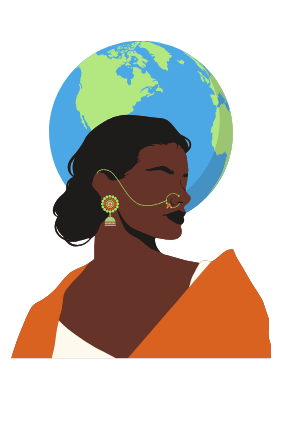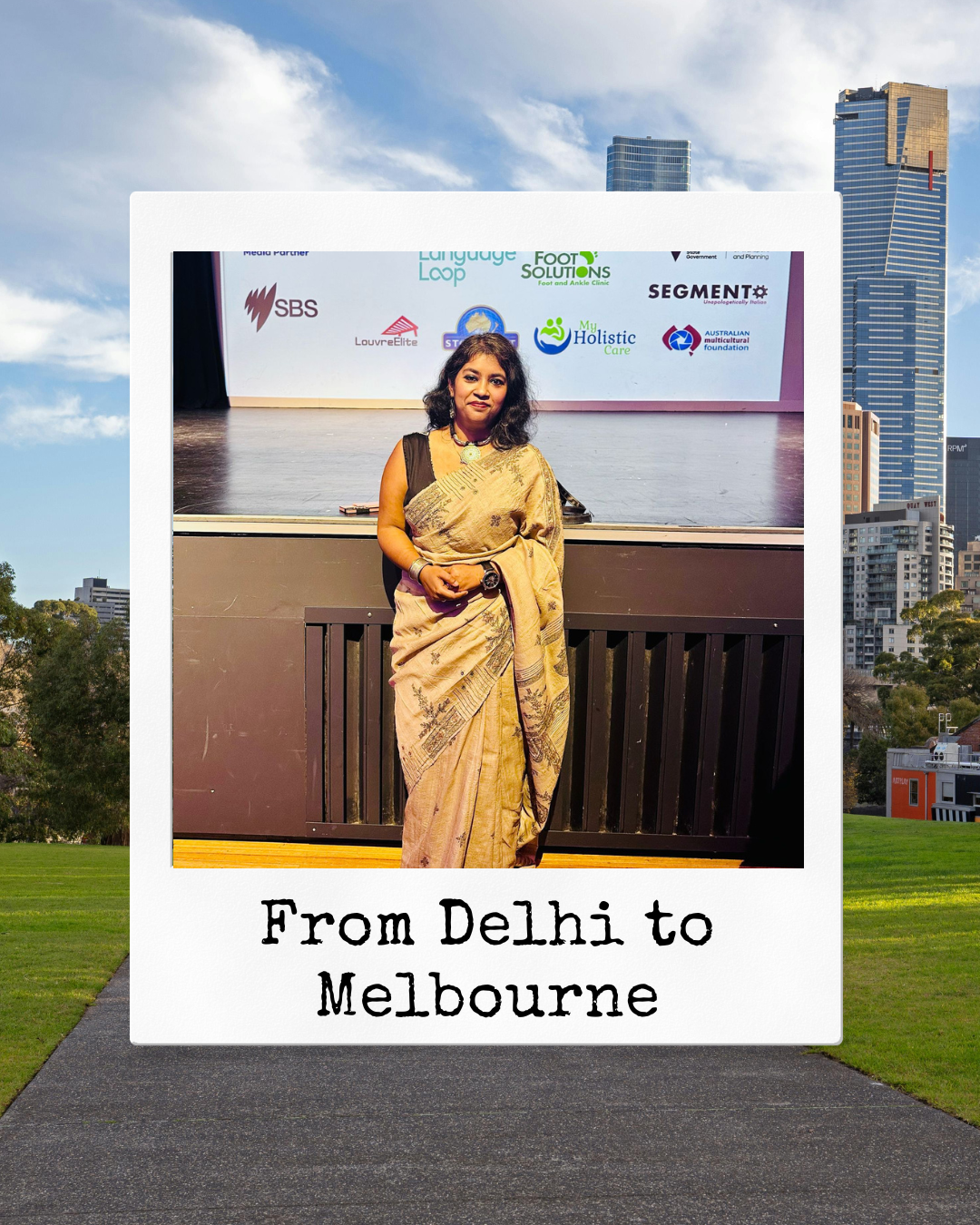Chris Mallika, originally from New Delhi, India, has lived in Melbourne for 11.5 years after receiving a full scholarship to pursue a PhD in nano-biotechnology at Swinburne University.
Post-PhD, she transitioned to the corporate world. Chris faced internalised racism and intrusive questions about her personal life as an international student.
Speaking to Indian Women Abroad, she emphasised the importance of financial education and mental health awareness.
Chris also hosts a podcast addressing taboo topics in the South Asian community, such as mental health and LGBTQ+ rights. Here’s her story:
What was the reason behind your move to Melbourne? Is this the first city you moved to?
Yeah, it’s the first city, and I’ve stayed here ever since. I got a scholarship to pursue my PhD in nano-biotechnology from Swinburne University, and that was a 100% scholarship. So I was like, I will take this opportunity. And that’s the reason I was here.
Previously, I did my masters in biomedical engineering at NIT Rourkela and my bachelor’s in engineering from Calcutta.
And what was your experience like? 11 and a half years ago… I am assuming things have changed a lot?
Of course, because when I came here, I didn’t have any friends and family. The only thing I could see missing then were these open and safe spaces [we have now] where women could come and share their stories without the fear of judgment.
How was your experience as an international student?
To be very honest, I had an excellent supervisor. I had no problems in my PhD journey because she made sure that we all finished ahead of our time. But the kind of internalised racism that I faced within our community is still very much present, and I think it’s growing day by day. So that was the only thing that I faced.
Could you give an example of that?
So the very first thing is, you know, my name. It is a little different, right?
People who didn’t know me then just assumed things, and they had questions about, ‘oh, what’s happening in your family? Is your father Christian, or is your mom Muslim? Or why is your name this? And why are you not married?’.
And if you’re a single child who’s looking after your parents… Questions that people had no authority to ask, but they still did. And more often than not, these questions came from my South Asian community which is still very much the case.
After you finished your PhD, what did your journey look like? What did you do?
I was a teaching assistant for a while and did two post-PhD projects. And in 2019, I moved into the corporate world and have been working there ever since.
What has life been like as an Indian woman living in a different country? Has your personal life changed?
I live by myself. So the journey, obviously, has been with its ups and downs. Some days are good days, some days are awful. You know, it’s a part and parcel of life.
But living by myself, life has taught me to be very independent so I can make decisions by myself.
I think I have a moderate to good social circle around me, and I’ve been podcasting for a while, so that’s something that I absolutely love doing. And through that journey, I’ve come in touch with some amazing people and friends who have now become family. So, yeah, can’t complain, really.
Can you expand on your podcast? That sounds very interesting.
The podcast is a platform that I’ve created that deals with taboo topics in the South Asian community. And as a human being, I am very, very passionate to address sensitive issues such as mental health and marital rape and, you know, men’s rights, and the LGBTQI+ community and their acceptance and transgender rights.
These issues that we’re not usually comfortable addressing in our bedrooms and drawing rooms, I like to address them head-on.
And with your personal experience, what do you think were the biggest challenges?
Here, one of the constant challenges, I think is we need to learn about handling money… financial independence. Independence is the wrong word. Financial education, literacy.
Because often you have situations where you have to take big positions and take care of your finances.
And the other one was when I had my journey with mental health. It was back when my family wasn’t even aware.
So it’s taken us four or five years to kind of normalise this conversation in our drawing room, so I would say that was a challenge I had to tackle by myself.
That makes a lot of sense. And do you think being in a foreign country, a country like Australia, made that journey easier for you in terms of, you know, topics that are not discussed openly?
Absolutely, I can’t even imagine, had I been in India… I can’t even fathom the journey and what that would have looked like if I had opened up back then that, you know, not feeling okay. So absolutely.
What is the biggest advice that you would give to someone who is thinking of moving abroad, especially a woman?
Look, if you are a student and you’re single, then I must say that don’t trust anyone on their face value and looking through people is a skill we often don’t learn until we get hurt.
If you’re someone who’s getting married and moving in, I would advise you to be aware of your rights. Before someone else says anything to you, you have to make sure you’re aware of what your rights are.
In this country — it’s a beautiful country — you just have to be self-aware and to the broader community. I think I would also say, please don’t judge. That’s about it.
And with the broader community, many women have found friends through social groups. Has that been your journey as well?
Some of my close friends today are from specific community groups. Since I’m a dancer, some of my friends I met through my passion for dancing. Some of my friends are through my passion for community engagement.
If you are looking for friends, if someone’s coming to a different country and looking for friends or companionship, you should look into different communities.
‘Companionship’ is a very broad word nowadays. I think the definition of companionship is really, really bold. So my one-line advice to people would be that you need to have a certain amount of clarity in what you’re seeking.
Not being clear, and trying and testing things out is fine, but after a certain age, I think the element of clarity and sanity is required. If not, you’ll keep on meandering. And you know, it’s hard to get very good people these days.
And are there any specific things you miss about being home back in India?
Oh yeah, I am a proud Delhite. So I miss Delhi ke golgappe. I miss them like crazy. I miss Mom’s home-cooked food. I miss the Delhi charm.
I know Delhi is infamous for a lot of reasons, and I agree, but Delhi has its own spark and charm. I absolutely miss it. Other than that, nothing really. We have all the festivals here, I wear sarees very frequently. So dressing up is not a problem. Food is not a problem. I mean, I really have to thank Australia for giving us almost what we need.
How different do you think your life is? You know, living in a different country, being an Indian woman.
We know back in India, there are certain expectations, certain stereotypes, and certain self-imposed rules about what you do, what you say, what you eat, and things like that.
Well, what I realised in 11 years here is that most people don’t judge you. That’s an amazing liberation to have, doing what you want, wearing what you want. Nobody bats an eyelid. Relationships… People don’t care, your neighbors don’t go out and question you, ‘oh, why are you not married? Why you’re not having kids’, unless and until you have very nosy neighbors.
In general, people keep to themselves. So it’s a very different dynamic. It’s like comparing an apple to an orange.
The independence you get in this country, you start loving it after a while.
And driving… every time I head back to Delhi, I look at the roads and I’m like, I don’t think I can ever drive in Delhi, but here I’ve taken out my car at 12 in the night…
Because there’s a sense of safety as well. That aligns with a lot of other things people have shared as well. So I think that’s a very universal
feeling for all the women…
Absolutely. And then the biggest thing is you’re not questionable. If you’re single, you’re not questioned, even if you’re in a relationship…
Let me give an example: in India, we say we’ve evolved. But people still don’t take live-in relationships that easily. But here, nobody cares, as long as you do it together. You love each other, even if you’re trying it out… to each their own, right?
So all these little things, your choices, whatever you want to eat or dress up or go out with… And the biggest thing I think is the LGBTQIA+ community acceptance here is amazing.



One response to “A different kind of liberation: Chris’ 11 year journey in Melbourne”
This article is packed with great information and is very helpful.
The website is an excellent resource for learning.